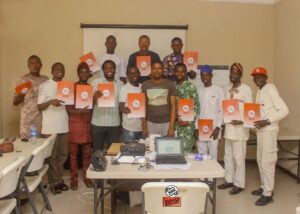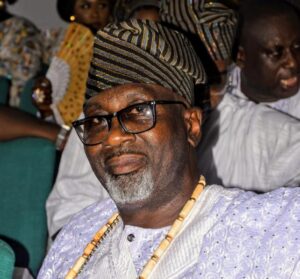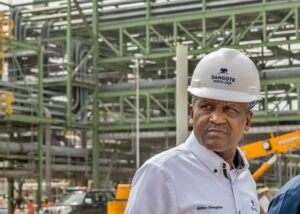Only through collective effort and a willingness to embrace change can we hope to turn our current situation around. – Abayomi Odunowo.
Eleven years ago, during the administration of Goodluck Jonathan, the then charismatic CBN Governor, Sanusi Lamido, issued a grave warning about the future of the Nigerian economy. He spoke of the impending consequences of the government’s reckless spending and lack of fiscal responsibility. However, his words fell on deaf ears, and he was dismissed as a mere motivational speaker. Little did we know that his predictions were alarmingly accurate.
Today, we find ourselves in the mess that was predicted long before 2013. The economic challenges we face did not manifest overnight. They have been brewing for over a decade, and the warning signs were there for all to see. Sanusi Lamido had forewarned of the dire consequences that lay ahead for those who would lead the country from 2015 onwards, yet his words were not heeded.
The lack of prudent fiscal management, coupled with corruption and mismanagement, has led us to where we are today. Our economy is struggling, inflation is on the rise, and the standard of living for many Nigerians has deteriorated. Had we listened to the warnings and taken necessary action, perhaps we could have averted the current crisis.
It is imperative that we learn from our past mistakes and take heed of warnings from experts in the field. We cannot afford to ignore sound economic advice, and we must hold our leaders accountable for their actions. The current economic situation should serve as a harsh reminder of the consequences of negligence and a call to action for better governance and fiscal responsibility in the future.
The phrase “the chickens have now come home to roost” is an apt description of the current economic situation that we find ourselves in. For far too long, we have turned a blind eye to the unsustainable practices and reckless spending that have led us to this point. Now, we are facing the consequences of our past actions, and it is all too easy to point fingers and blame either the previous government or the current one.
However, the truth is that we all bear responsibility for the state of our economy. Each one of us has been complicit in the mismanagement of our finances, whether through our acceptance of corruption, our reluctance to pay taxes, or our own personal indulgences. It is time for us to accept this truth and move forward with a sense of accountability.
The current government may have a role to play in charting a new course for our nation, but it cannot do so alone. It will require the cooperation and sacrifice of every citizen. We must focus on finding new and effective ways to produce what we consume locally, in order to alleviate the strain on our economy.
It is also crucial that we adjust our lifestyles and focus on bringing prices down, rather than expecting salary increases to match the rising cost of living. We must be willing to make sacrifices in order to secure a better future for our country. It will not be easy, but it is the only way forward. Only through collective effort and a willingness to embrace change can we hope to turn our current situation around.
Let me remind you of the facts that were laid out then. To start, we need to all agree on some fundamentals. The then Minister of Finance and Coordinating Minister claimed that Nigerians were consuming 35 million liters of fuel per day with a population of 180 million people. However, what she did not tell us is the actual number of cars we have in Nigeria. How is it possible that 35 million is 20% of the entire population of Nigeria?
Well, according to the latest data available, there were a total of 11.8 million vehicles in Nigeria as of 2018. Of this number, 39% (4.6 million) were privately owned, 56% (6.7 million) were commercial vehicles, 1.1% (135,000) were government vehicles, and 0.4% (5,834) were owned by diplomats. Additionally, Nigeria accounts for 75% of the 15.5 million registered vehicles in West Africa, which amounts to 11,869,800 vehicles.
Fast forward to the most recent data from 2020, which reports 11,605,207 registered motor vehicles in Nigeria. Furthermore, the number of registered government vehicles was reported at 149,469 units in June 2018. This paints a much clearer picture of the vehicle population in Nigeria and how it relates to the fuel consumption.
It is important to note that the automotive industry in Nigeria is heavily dependent on imports, and the country is working on increasing local production. The goal is to have 50% of vehicles locally built or assembled, including electric vehicles, within the next ten years. This not only aims to reduce the country’s dependence on fuel imports but also to boost the local economy and create job opportunities.
So, let’s come back to the claim of consuming 35 million liters of fuel per day. With the new data at hand, it is evident that there is a significant disparity between the reported fuel consumption and the actual number of vehicles in Nigeria. This begs the question of whether the initial claim was accurate or if there were other factors at play that were not taken into account.
It is crucial to consider all the facts and figures before jumping to conclusions or making bold claims. The automotive industry in Nigeria is evolving, and as local production increases, it will be interesting to see how this impacts fuel consumption and the overall economy. Let this serve as a reminder to always question and seek the truth behind the numbers presented to us. Let’s not forget, the devil is in the details.
The petroleum subsidy scam has been a longstanding issue in Nigeria, and the extent to which it has plagued the nation’s economy cannot be overstated. The Nigerian Maritime Administration and Safety Agency (NIMASA) has been at the forefront of efforts to address this issue, shedding light on the fraudulent activities of vessels claiming to have brought petrol into the country.
It has been revealed that certain vessels, after off-loading their contents in the Benin Republic and the Republic of Togo off-shore, would then come into Nigeria, bribe officials, and fraudulently claim to have brought petrol into the country. This ruse allowed them to collect subsidies for not actually bringing anything of value into the country. Furthermore, reports have shown that 15 vessels claimed to have berthed in Nigerian ports, even though data indicated that 13 of these ships were nowhere close to Nigeria. Despite this evidence, officials in charge would sign official documents claiming to have seen the vessels.
The sheer magnitude of the price difference between the subsidized N65 and actual cost of N165 creates a breeding ground for corruption, with an estimated N1 trillion being enough to bribe individuals within the system. Overall, this issue highlights the substantial challenge of corruption and the need to address the opportunities that enable these corrupt practices.
Let’s talk about what we all agree on when it comes to the state of our government and public services. Firstly, corruption is a pervasive issue that needs to be addressed. It’s a problem that affects every aspect of our society and erodes trust in our institutions. We all agree that steps need to be taken to root out corruption and hold those responsible accountable.
Additionally, there is widespread acknowledgement of excess waste in government expenditure. We all agree that resources need to be allocated more efficiently and that unnecessary spending should be cut. It’s a consensus that prudent financial management is essential for the effective functioning of our government.
Moreover, there is a consensus that government execution and delivery have been lacking. We all agree that improvements are needed to ensure that public services are delivered in a timely and effective manner. Whether it’s in healthcare, education, or infrastructure, there is a shared understanding that government performance needs to be elevated.
Ultimately, as Nigerians in both the public and private sectors, we all have a responsibility to work towards these common goals. It’s imperative that we come together to address these issues and strive for a better, more efficient government and public services. By finding common ground and working together, we can foster positive change and progress for our nation.
Corruption is a pervasive issue in many countries around the world, and Nigeria is no exception. It is common to hear people complain about the corrupt practices of government officials, whether it be misappropriation of funds, nepotism, or bribery. Many individuals express frustration and dissatisfaction with the way the government operates, often resorting to criticism and blame. However, when confronted with the question of whether they have ever offered a government official a bribe, the response is often met with silence or a hesitant acknowledgement.
It is easy to condemn the actions of others, yet the reality is that corruption thrives when individuals are willing to participate in it. The exchange of bribes and favors perpetuates a system of dishonesty and favoritism, ultimately undermining public trust and the effectiveness of governance. Therefore, it is imperative for individuals to reflect on their own actions and consider how they may be contributing to the problem.
In the Yoruba culture, Ogun, the god of Iron, is often called upon to bear witness to the truth. Therefore, it is a sobering thought to consider how many can swear before Ogun that they have not engaged in corrupt behavior. Ultimately, addressing corruption requires a collective effort to hold both government officials and citizens accountable for their actions, and to cultivate a culture of integrity and transparency.
In 2013, the Nigerian economy experienced a significant imbalance in its petroleum sector. When we look at the facts, it is evident that between January and December of that year, the total forex sold to petroleum marketers exceeded $8 billion dollars. In addition, the total amount of subsidy payment given to these petroleum marketers was another $8 billion dollars. This brings the total to over $16 billion dollars, a substantial sum by any measure.
Furthermore, it is important to note that during the same period, the total accrued revenue to the country from the sales of petroleum-related products was slightly less than $16.2 billion dollars. This disparity raises concerns about the sustainability and efficiency of the petroleum subsidy system in the country.
This situation has significant implications for the overall economy. The massive amount of subsidy payments, coupled with the relatively low revenue from petroleum sales, adds strain to the country’s finances. These imbalances can lead to budget deficits and hinder the government’s ability to allocate resources to other crucial sectors such as healthcare, education, and infrastructure.
It is clear that this imbalance in the petroleum sector has had a considerable impact on the Nigerian economy in 2013. It is crucial for policymakers to address these issues and ensure that the country’s petroleum sector is managed in a sustainable and financially responsible manner.
Nigeria’s heavy reliance on its petroleum industry for revenue has led to a concerning situation where the country pays more money to the petroleum markets than it earns overall. This raises several important questions about the country’s economic structure and priorities. What kind of country operates in a way that sees more money leaving the country than it earns? Why does Nigeria have such a disproportionate dependence on the petroleum industry for its economic stability?
When financial experts use terms like per capita income, it can be confusing for the average person. However, the reality is that Nigeria produces 2.2 million barrels of crude oil every day. This translates to one barrel of crude for every eight people in the country. In comparison, Algeria, a nearby gas-producing country, produces one barrel for every 30 people, while Saudi Arabia, a prominent oil-producing nation, produces one barrel for every three citizens every day.
These figures raise concerns about Nigeria’s economic sustainability and the distribution of wealth within the country. With such a heavy reliance on the petroleum industry, Nigeria is vulnerable to fluctuations in global oil markets. It also raises questions about equitable distribution of resources within the country, as the wealth generated by the petroleum industry does not appear to benefit the population as a whole.
Overall, the imbalance between the money spent on petroleum markets and the country’s overall earnings raises important questions about Nigeria’s economic policies and priorities.
In Nigeria, the production of one barrel of oil is meant to cater to the needs of 80 people. However, when we factor in the country’s population, this production is effectively divided among 160 Nigerians. These people require access to power, infrastructure, healthcare, education, and food, in addition to the operational expenses needed to sustain these services. Given this scenario, the question arises: how can the available resources be allocated in a way that best serves the needs of the population?
One critical issue that has been draining the country’s resources is the allocation of funds for subsidies. Reports indicate that one-third of the revenue generated has been used to pay these subsidies, while 70% of the balance is allocated towards covering the salaries of government employees. Moreover, the option of retrenching workers to free up resources is off the table, as it would lead to a multitude of problems. This leaves us with the challenge of finding ways to reallocate resources without causing undue hardship.
It’s important to note that the same people who are complaining about the government’s excessive spending are also the ones demanding a minimum wage of N200,000. This creates a significant dilemma, as the government must balance the demand for higher wages with the need to free up resources for essential services. This situation demands a careful and strategic approach to ensure that the needs of the population are met without placing an unsustainable burden on the government.
Critics may argue that removing subsidies will lead to hardships for the people. However, from an economic standpoint, the real question is the cost of removing subsidies versus the cost of maintaining them. It’s essential to weigh the short-term challenges against the long-term consequences. The Central Bank of Nigeria (CBN) governor warned in 2013 that the country was on a dangerous path, and failure to address the growing debt burden would lead to even more severe consequences in the future.
The blame for the devaluation of the Naira is often directed at the government. However, it’s crucial to recognize that the current economic challenges are the result of long-standing issues that have been exacerbated over time. The way forward requires a multi-faceted approach that addresses both short-term needs and long-term sustainability.
The production of oil in Nigeria is meant to meet the needs of 160 people per barrel. The allocation of resources is a complex and challenging endeavor, with the demand for subsidies and high wages adding further strain on the government’s finances. However, the long-term consequences of maintaining the status quo are far more severe. It’s essential to address these challenges with a strategic and forward-thinking approach that balances the immediate needs of the population with the future sustainability of the country’s economy. The government must make difficult decisions and prioritize the allocation of resources in a way that best serves the long-term interests of the nation.
The last economic crisis that faced Europe is one that cannot be ignored. The drastic crash in petroleum prices in 2008, from $147 per barrel to $37 per barrel, was a shock to the global economy. This was a significant deviation from the simulations made by the World Bank and the International Monetary Fund, which suggested that petroleum prices could not go lower than $85 per barrel. The Nigerian economy managed to weather the storm at that time due to its reserve of $60 billion, but today, that reserve has dwindled to $30 billion. This situation has left Nigeria vulnerable and ill-prepared for future economic shocks. The recent fluctuation in the value of the dollar, with it standing at 1450 in 2024, has further exacerbated the crisis, catching many by surprise. It is clear that decisive action needs to be taken to salvage the situation.
The severity of the crisis at hand demands a united effort from all stakeholders. This is not the time for the blame game or for allowing sentiments and emotions to cloud our judgment. It is a time for level-headedness and cooperation. The implications of the current economic crisis are far-reaching and require everyone to come together and work towards a common goal.
One of the most pressing issues in the current crisis is the depletion of Nigeria’s foreign reserves. These reserves act as shock absorbers for the economy, providing a buffer against external shocks. With the reserves now at a critically low level, Nigeria is vulnerable to any future economic upheavals. This poses a significant threat to the stability and wellbeing of the country. It is imperative that immediate action be taken to address this issue and bolster the reserves to ensure the country’s economic security.
In addition to the depletion of reserves, the fluctuation in the value of the dollar has significantly impacted Nigeria’s economy. The sharp increase in the value of the dollar has had a ripple effect on various sectors, leading to increased costs and decreased purchasing power. This has further exacerbated the economic crisis and has put additional strain on the country’s resources. It is vital that measures are put in place to stabilize the value of the dollar and mitigate its impact on the economy.
The current situation calls for a comprehensive and coordinated approach to address the crisis. It is crucial for all stakeholders, including the government, private sector, and civil society, to come together and work towards finding solutions. This may involve implementing measures to shore up the reserves, stabilizing the value of the dollar, and implementing policies to stimulate economic growth. It is only through a unified and concerted effort that the country can hope to overcome this crisis.
In conclusion, the economic crisis facing Nigeria is a grave and pressing issue that demands immediate attention and action. The depletion of reserves and the fluctuation in the value of the dollar have significantly impacted the country’s economy and have left it vulnerable to future shocks. It is incumbent upon all stakeholders to work together to address the crisis and steer the country towards recovery. This is not a time for division or finger-pointing; it is a time for unity and collaboration. Only through a united effort can Nigeria hope to weather the storm and emerge stronger on the other side.
Otunba Abdulfalil Abayomi Odunowo
National Chairman AATSG
10th February, 2024.







